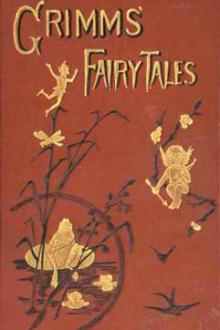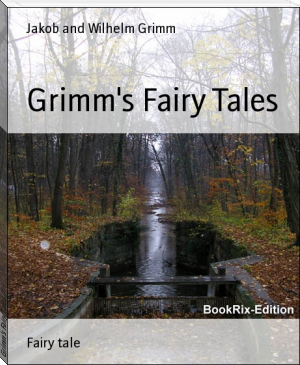Household Tales, Wilhelm Grimm [good books to read for women TXT] 📗

- Author: Wilhelm Grimm
- Performer: -
Book online «Household Tales, Wilhelm Grimm [good books to read for women TXT] 📗». Author Wilhelm Grimm
She ran back home, trembling like an aspen-leaf. The old woman was standing on the threshold, and the girl was about to relate what had befallen her, but the old woman laughed kindly, and said, “I already know all.” She led her into the room and lighted a new log. She did not, however, sit down to her spinning again, but fetched a broom and began to sweep and scour, “All must be clean and sweet,” she said to the girl. “But, mother,” said the maiden, “why do you begin work at so late an hour? What do you expect?” “Dost thou know then what time it is?” asked the old woman. “Not yet midnight,” answered the maiden, “but already past eleven o’clock.” “Dost thou not remember,” continued the old woman, “that it is three years to-day since thou camest to me? Thy time is up, we can no longer remain together.” The girl was terrified, and said, “Alas! dear mother, will you cast me off? Where shall I go? I have no friends, and no home to which I can go. I have always done as you bade me, and you have always been satisfied with me; do not send me away.” The old woman would not tell the maiden what lay before her. “My stay here is over,” she said to her, “but when I depart, house and parlour must be clean: therefore do not hinder me in my work. Have no care for thyself, thou shalt find a roof to shelter thee, and the wages which I will give thee shall also content thee.” “But tell me what is about to happen,”
the maiden continued to entreat. “I tell thee again, do not hinder me in my work. Do not say a word more, go to thy chamber, take the skin off thy face, and put on the silken gown which thou hadst on when thou camest to me, and then wait in thy chamber until I call thee.”
But I must once more tell of the King and Queen, who had journeyed forth with the count in order to seek out the old woman in the wilderness. The count had strayed away from them in the wood by night, and had to walk onwards alone. Next day it seemed to him that he was on the right track. He still went forward, until darkness came on, then he climbed a tree, intending to pass the night there, for he feared that he might lose his way. When the moon illumined the surrounding country he perceived a figure coming down the mountain. She had no stick in her hand, but yet he could see that it was the goose-girl, whom he had seen before in the house of the old woman. “Oho,” cried he, “there she comes, and if I once get hold of one of the witches, the other shall not escape me!” But how astonished he was, when she went to the well, took off the skin and washed herself, when her golden hair fell down all about her, and she was more beautiful than any one whom he had ever seen in the whole world. He hardly dared to breathe, but stretched his head as far forward through the leaves as he dared, and stared at her. Either he bent over too far, or whatever the cause might be, the bough suddenly cracked, and that very moment the maiden slipped into the skin, sprang away like a roe, and as the moon was suddenly covered, disappeared from his eyes. Hardly had she disappeared, before the count descended from the tree, and hastened after her with nimble steps. He had not been gone long before he saw, in the twilight, two figures coming over the meadow. It was the King and Queen, who had perceived from a distance the light shining in the old woman’s little house, and were going to it. The count told them what wonderful things he had seen by the well, and they did not doubt that it had been their lost daughter. They walked onwards full of joy, and soon came to the little house. The geese were sitting all round it, and had thrust their heads under their wings and were sleeping, and not one of them moved. The King and Queen looked in at the window, the old woman was sitting there quite quietly spinning, nodding her head and never looking round. The room was perfectly clean, as if the little mist men, who carry no dust on their feet, lived there. Their daughter, however, they did not see. They gazed at all this for a long time, at last they took heart, and knocked softly at the window. The old woman appeared to have been expecting them; she rose, and called out quite kindly, “Come in,—I know you already.” When they had entered the room, the old woman said, “You might have spared yourself the long walk, if you had not three years ago unjustly driven away your child, who is so good and lovable. No harm has come to her; for three years she has had to tend the geese; with them she has learnt no evil, but has preserved her purity of heart. You, however, have been sufficiently punished by the misery in which you have lived.” Then she went to the chamber and called, “Come out, my little daughter.” Thereupon the door opened, and the princess stepped out in her silken garments, with her golden hair and her shining eyes, and it was as if an angel from heaven had entered.
She went up to her father and mother, fell on their necks and kissed them; there was no help for it, they all had to weep for joy. The young count stood near them, and when she perceived him she became as red in the face as a moss-rose, she herself did not know why. The King said, “My dear child, I have given away my kingdom, what shall I give thee?” “She needs nothing,” said the old woman. “I give her the tears that she has wept on your account; they are precious pearls, finer than those that are found in the sea, and worth more than your whole kingdom, and I give her my little house as payment for her services.” When the old woman had said that, she disappeared from their sight. The walls rattled a little, and when the King and Queen looked round, the little house had changed into a splendid palace, a royal table had been spread, and the servants were running hither and thither.
The story goes still further, but my grandmother, who related it to me, had partly lost her memory, and had forgotten the rest. I shall always believe that the beautiful princess married the count, and that they remained together in the palace, and lived there in all happiness so long as God willed it. Whether the snow-white geese, which were kept near the little hut, were verily young maidens (no one need take offence,) whom the old woman had taken under her protection, and whether they now received their human form again, and stayed as handmaids to the young Queen, I do not exactly know, but I suspect it. This much is certain, that the old woman was no witch, as people thought, but a wise woman, who meant well. Very likely it was she who, at the princess’s birth, gave her the gift of weeping pearls instead of tears. That does not happen now-a- days, or else the poor would soon become rich.
180 Eve’s Various Children
When Adam and Eve were driven out of Paradise, they were compelled to build a house for themselves on unfruitful ground, and eat their bread in the sweat of their brow. Adam dug up the land, and Eve span. Every year Eve brought a child into the world; but the children were unlike each other, some pretty, and some ugly. After a considerable time had gone by, God sent an angel to them, to announce that he was coming to inspect their household. Eve, delighted that the Lord should be so gracious, cleaned her house diligently, decked it with flowers, and strewed reeds on the floor. Then she brought in her children, but only the beautiful ones. She washed and bathed them, combed their hair, put clean raiment on them, and cautioned them to conduct themselves decorously and modestly in the presence of the Lord. They were to bow down before him civilly, hold out their hands, and to answer his questions modestly and sensibly. The ugly children were, however, not to let themselves be seen. One hid himself beneath the hay, another under the roof, a third in the straw, the fourth in the stove, the fifth in the cellar, the sixth under a tub, the seventh beneath the wine-cask, the eighth under an old fur cloak, the ninth and tenth beneath the cloth out of which she always made their clothes, and the eleventh and twelfth under the leather out of which she cut their shoes. She had scarcely got ready, before there was a knock at the house-door. Adam looked through a chink, and saw that it was the Lord. Adam opened the door respectfully, and the Heavenly Father entered. There, in a row, stood the pretty children, and bowed before him, held out their hands, and knelt down. The Lord, however, began to bless them, laid his hands on the first, and said, “Thou shalt be a powerful king;” and to the second, “Thou a prince,” to the third, “Thou a count,” to the fourth, “Thou a knight,” to the fifth, “Thou a nobleman,” to the sixth, “Thou a burgher,” to the seventh, “Thou a merchant,” to the eighth, “Thou a learned man.” He bestowed upon them also all his richest blessings. When Eve saw that the Lord was so mild and gracious, she thought, “I will bring hither my ill-favoured children also, it may be that he will bestow his blessing on them likewise.” So she ran and brought them out of the hay, the straw, the stove, and wherever else she had concealed them. Then came the whole coarse, dirty, shabby, sooty band. The Lord smiled, looked at them all, and said, “I will bless these also.” He laid his hands on the first, and said to him, “Thou shalt be a peasant,” to the second, “Thou a fisherman,” to the third, “Thou a smith,” to the fourth, “Thou a tanner,” to the fifth, “Thou a weaver,”
to the sixth, Thou a shoemaker,” to the seventh, “Thou a tailor,” to the eighth, “Thou a potter,” to the ninth, “Thou a waggoner,” to the tenth, “Thou a sailor,” to the eleventh, “Thou an errand-boy,” to the twelfth, “Thou a scullion all the days of thy life.”
When Eve had heard all this she said, “Lord, how unequally thou dividest thy gifts! After all they are all of them my children, whom I have brought into the world, thy favours should be given to all alike.” But God answered, “Eve, thou dost not understand. It is right and necessary that the entire world should be supplied from thy children; if they were all princes and lords, who would grow corn, thresh it, grind and bake it? Who would be blacksmiths, weavers, carpenters, masons, labourers, tailors and seamstresses? Each shall have his own place, so that one shall support the other, and all shall be fed like the limbs of one body.” Then Eve answered, “Ah, Lord, forgive me, I was too quick in speaking





Comments (0)